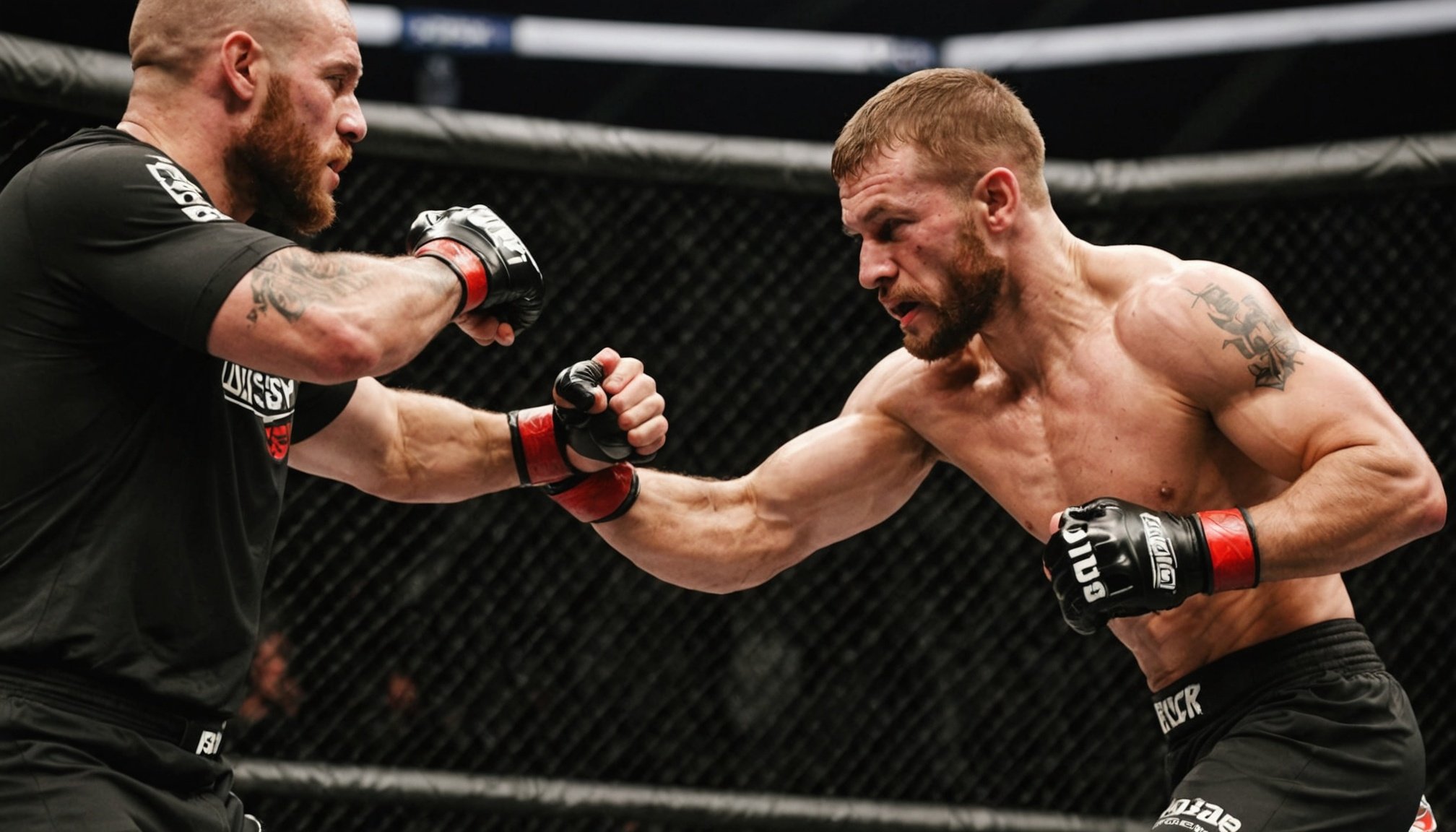Understanding Resilience in MMA
Resilience in sports, particularly in MMA, is critical for an athlete’s success and overall well-being. Resilience refers to the ability to adapt and recover from setbacks, which is essential in an intense and physically demanding sport like mixed martial arts. Within the realm of resilience, one must consider both physical and mental aspects.
Mental toughness plays a significant role in an MMA fighter’s ability to withstand challenges. It’s not just about physical endurance; the mental ability to keep moving forward despite defeats is crucial. This mental resilience helps fighters maintain a steady MMA strategy, even when things don’t go as planned.
Topic to read : Ground game excellence: expert techniques from uk jiu-jitsu coaches for mastering the mat
The psychological impact of defeats can be profound, affecting an athlete’s confidence and motivation. Understanding and developing strategies to fortify mental resilience can prevent fighters from being overwhelmed by losses. Distinguishing between physical and mental resilience allows athletes to address weaknesses effectively.
For MMA fighters, developing resilience is not a one-time thing; it involves a continuous process of strengthening both mind and body. By fostering mental toughness, fighters can improve their MMA strategy, ensuring they remain competitive and motivated. Emphasizing resilience in sports can transform perceived failures into stepping stones for future successes.
In the same genre : Elevate your boxing game: leveraging cutting-edge technology for enhanced punching precision among uk fighters
Techniques for Overcoming Defeats
Overcoming defeats in MMA requires intentional resilience techniques and a robust focus on cultivating the right fighter mindset. To transform setbacks into opportunities, specific mental strategies can play a vital role.
Reflection and Analysis
A successful comeback often begins with thorough reflection and analysis. Fighters must dissect their performances critically, understanding what went wrong. Highlight successful moments to replicate in future matches. This analytical approach allows fighters to step back, absorb, and enhance their strategies.
Seeking Feedback
Seeking feedback from coaches and peers is essential for growth. Honest feedback can uncover blind spots, providing fighters with insights they might not otherwise see. Coaches, with their experience, can offer perspective on both physical aspects and mental resilience, refining the fighter’s overall strategy.
Setting New Goals
Transitioning from defeat to victory involves setting new, realistic goals. These goals should be actionable and achievable, guiding fighters towards improvement without overwhelming them. The process of goal-setting reinforces a fighter mindset, inspiring renewed motivation and a clearer path forward.
By focusing on reflection, feedback, and goal-setting, MMA fighters can effectively develop resilience, fostering an unshakable mental toughness essential to success.
Case Studies of UK MMA Fighters
Examining UK MMA success stories offers invaluable lessons on resilience and recovery from adversity. These stories highlight fighters’ journeys and the strategies they used to overcome setbacks.
Notable Fighter Example 1
A prime example is Dan Hardy’s remarkable return from a career-threatening medical issue. Hardy utilised a combination of fighter recovery techniques and mental strategies to redefine his fighting path. His emphasis on understanding adversities and adapting his training regimen showcases the power of resilience. By acknowledging personal limits and steadily rebuilding his strength, Hardy demonstrates the potential of blending both physical and mental approaches.
Notable Fighter Example 2
Another inspiring figure is Ross Pearson, who repeatedly demonstrated the capacity to bounce back from defeats. Pearson’s journey emphasises setting incremental goals and adjusting his fighter mindset. His strategic shift towards integrating feedback and improving tactical skills illustrates resilience in action.
Lessons Learned from Each Case
Through these narratives, aspiring athletes learn three crucial lessons:
- Adaptability: Adjusting strategies as needed.
- Perseverance: Maintaining focus amid obstacles.
- Embracing feedback: Growing from constructive criticism.
Understanding these approaches provides aspiring MMA fighters with practical pathways to cultivate resilience, helping them convert challenges into opportunities for growth.
Building Mental Strength
Understanding mental preparation in MMA is vital for enhancing overall performance. Building mental strength involves various visualization techniques and coping mechanisms that help fighters maintain focus and manage stress effectively.
Visualization plays a crucial role. Fighters mentally rehearse scenarios to anticipate challenges and sharpen their reactions. This mental imagery aids in refining techniques, boosting confidence, and reducing anxiety before fights. The mental rehearsals allow athletes to feel prepared and adaptable once they step into the ring.
Equally important are coping mechanisms for handling stress and pressure. These include strategies such as controlled breathing, meditation, and mindfulness exercises. These techniques foster a calm mental state, enabling fighters to concentrate better during intense situations.
Benefit from constructing a toolbox of mental strategies to address fight-day nerves or in-process anxieties. Consistent mental training enhances resilience, allowing fighters to remain balanced and focused when faced with unexpected challenges.
By prioritising mental preparation alongside physical training, MMA fighters can develop unmatched mental fortitude, setting a foundation for continued success and growth in their fighting careers. This well-rounded approach will support athletes in navigating adversities and harnessing their inner potential to achieve greatness within the octagon.
Expert Insights on Resilience
Seeking insights from experts in sports psychology can significantly enhance an MMA fighter’s ability to foster resilience. By understanding professional perspectives, athletes can integrate informed strategies into their training routines.
Interview with a Sports Psychologist
Renowned sports psychologists emphasize the integration of resilience in athletes by tailoring mental training to individual needs. Through guidance, fighters learn to identify specific stressors and develop tailored coping mechanisms, bolstering their mental toughness. Personalized approaches ensure that fighters can adapt mental strategies to effectively manage in-ring pressures.
Quotes from Experienced Fighters
Veteran fighters often share invaluable wisdom on resilience. For example, Michael Bisping asserts, “Embracing losses is pivotal to success.” His insights reveal the importance of acknowledging setbacks as part of growth. This mindset not only alleviates fear of failure but also fortifies mental resilience.
Practical Tips from Experts
Sports psychologists recommend techniques such as mindfulness and controlled breathing to enhance mental clarity. These practices are championed by experts as essential tools for managing the high-pressure scenarios common in MMA. Incorporating these strategies can keep fighters focused and mentally agile, thus supporting their overall MMA strategy.
By following expert advice, athletes can solidify their mental fortitude and resilience, leading to sustained performance improvements.
Actionable Advice for Athletes
Incorporating resilience tools into an athlete’s regimen ensures preparedness in the face of setbacks. Developing a personal resilience plan involves identifying unique challenges and tailoring strategies that bolster mental and physical recovery.
Athletes should utilise coping strategies focused on stress management and emotional regulation. Techniques such as visualisation and mindfulness offer robust ways to manage in-competition pressures. Integrating these mental practices into daily routines helps maintain focus and calm under stress.
Building an effective support network is also critical. Whether involving peers, coaches, or mental health professionals, surrounding oneself with a supportive community can offer necessary perspectives and encouragement. These networks enable athletes to work through challenges collaboratively, reinforcing resilience.
Incorporating a consistent routine for mental and emotional recovery can prevent burnout. Regular intervals of reflection combined with goal setting contribute to ongoing mental toughness. By developing and following an adaptive routine, athletes ensure they are prepared to tackle each new setback with renewed vigour.
Ultimately, applying these strategies equips athletes to transform adversity into growth opportunities, reinforcing strength and endurance essential for long-term success.











